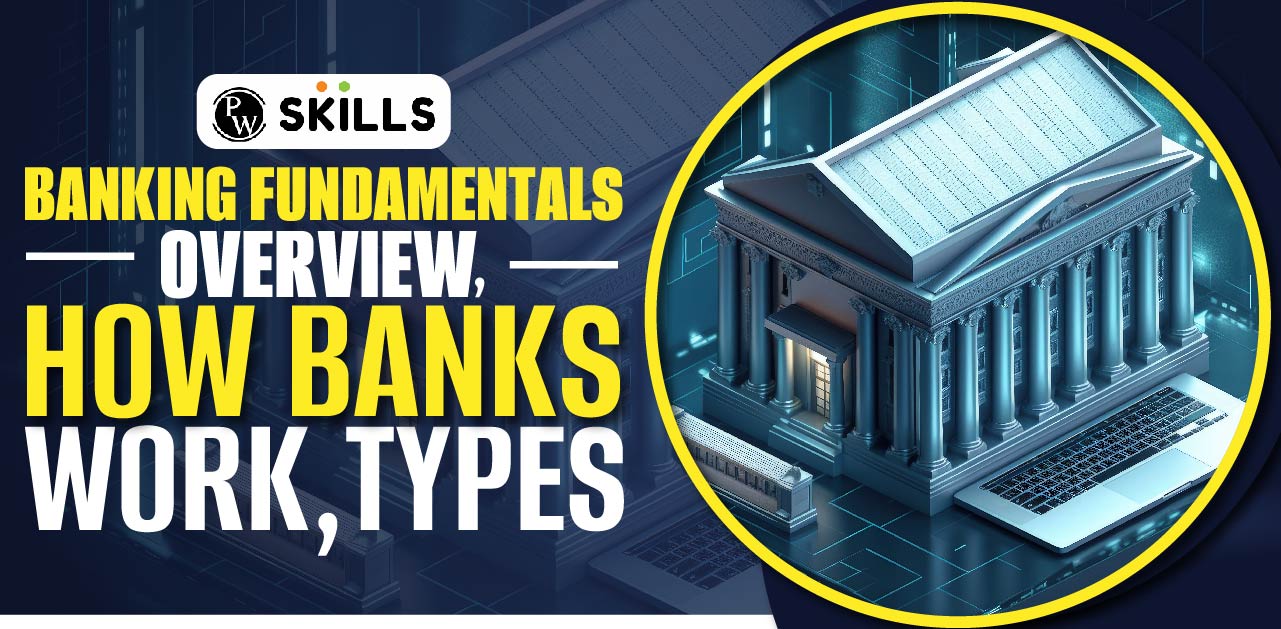Banking fundamentals encompass the principles and concepts central to the banking industry. Banking plays an essential role in the economic structure. Keep reading to know more about banking fundamentals!
Banking Fundamentals: Exploring the intricate world of banking can be daunting at first, but fear not – we have broken it down into manageable chunks to provide you with a solid understanding of the core principles. From the essential overview of the banking industry to the nitty-gritty details of how banks operate and the different types of banks out there, this post will cover it all.

Consider taking your learning to the next level by enrolling in the BFSI Course. Use the “STUDYBLISS” coupon to get instant discounts!
With proper knowledge and education from reputable sources like Physics Wallah’s BFSI course, we can confidently navigate the ever-changing financial world and secure our financial stability for years to come. So take a leap towards a rewarding career by enrolling in Physics Walla’s BFSI course today!
What are Banking Fundamentals?
A bank is a place where you can keep your money and also borrow money if you need it. Banks offer services like managing your wealth, changing currencies, and keeping your valuables safe. The government oversees and sets rules for banks to make sure they are doing things right.
Banks use the money people deposit to give loans to others and make a profit by charging interest. Some of that profit goes back to the people who have money in the bank, usually through savings accounts or CDs. Banks also make money by charging fees for different services, like managing investments or giving out mortgages.
Banks can be physical buildings or online, and they help move money between different people and businesses. They follow strict rules set by government entities like the Federal Reserve System to make sure everything is fair and safe. Banks are important because they provide essential services to individuals and businesses.
They offer different types of accounts to keep money safe, and customers can do things like depositing or withdrawing money and paying bills. This way, people can manage their money easily and even earn some extra money through interest.
Banking Fundamentals – How the Banking Industry Works
The banking industry serves as the backbone of modern economies, facilitating the flow of money, offering financial services, and contributing to economic growth. Understanding the fundamentals of banking is crucial for grasping its significance and how it operates.
1) Core Functions of Banks:
- Accepting Deposits: One of the primary functions of banks is to provide a safe place for individuals and businesses to deposit their money. These deposits serve as the primary source for banks to lend money and earn interest.
- Extending Loans: Banks utilize the deposited funds to provide loans to consumers and businesses. These loans can range from personal loans, mortgages, to business loans, helping to stimulate economic activities.
- Payment Services: Banks facilitate various payment mechanisms such as checks, electronic transfers, and debit/credit card transactions, ensuring smooth financial transactions.
2) Sources of Revenue:
- Interest Income: Banks earn a significant portion of their revenue through the interest earned on loans extended to customers.
- Fee-Based Income: Banks charge various fees for services like account maintenance, transaction processing, overdraft facilities, and advisory services.
- Investment Income: Banks also generate income by investing in securities, bonds, and other financial instruments.
3) Regulatory Framework:
- Regulatory Bodies: Governments and regulatory authorities such as the Federal Reserve, OCC, and FDIC oversee banks, ensuring they adhere to regulations, maintain solvency, and protect consumers’ interests.
- Capital Requirements: Banks are mandated to maintain certain capital reserves to cover potential losses, ensuring financial stability and minimizing systemic risks.
4) Technological Advancements:
- Digital Banking: With technological innovations, banks have transitioned to digital platforms, offering online banking, mobile banking, and digital payment solutions.
- Fintech Collaboration: Banks are increasingly collaborating with fintech startups, leveraging technology to enhance services, improve efficiency, and cater to evolving customer preferences.
5) Risk Management:
- Credit Risk: Banks evaluate borrowers’ creditworthiness, assessing the risk associated with lending money and determining interest rates.
- Operational Risk: Banks implement robust operational processes, systems, and controls to mitigate risks associated with internal failures, frauds, or system malfunctions.
- Regulatory Compliance: Banks adhere to stringent regulatory guidelines, ensuring compliance with laws, regulations, and ethical standards to maintain trust and credibility.
The banking industry is a multifaceted sector, encompassing various institutions, functions, and regulatory frameworks. By understanding the fundamentals of banking, one can appreciate its pivotal role in fostering economic growth, facilitating financial transactions, and ensuring stability in the financial system. As the industry continues to evolve with technological advancements and regulatory changes, staying informed and adaptable remains essential for stakeholders in the banking ecosystem.
Also Read: Banker Salary: In India, Per Month, Starting Salary, Highest Salary
Banking Fundamentals – Types of Bank Accounts
Bank accounts serve as fundamental financial instruments that enable individuals, businesses, and organizations to manage their money, facilitate transactions, and earn interest on deposits. Understanding the various types of bank accounts is crucial for making informed financial decisions and optimizing your banking experience. Here’s a comprehensive overview of the common types of bank accounts:
1) Savings Accounts:
- Purpose: Designed for individuals to deposit money and earn interest on their savings.
- Features: Typically have a lower interest rate than other investment options but offer liquidity and easy access to funds.
- Usage: Ideal for short-term savings goals, emergency funds, or accumulating funds for future expenses.
2) Checking Accounts:
- Purpose: Primarily used for daily transactions such as paying bills, making purchases, and accessing funds through checks or debit cards.
- Features: Allows unlimited withdrawals and deposits, often with no or minimal interest earnings.
- Usage: Essential for managing daily finances, receiving salary deposits, or conducting regular transactions.
3) Certificate of Deposit (CD):
- Purpose: A time-bound deposit where individuals deposit a specific amount for a predetermined period, earning a fixed interest rate.
- Features: Generally offer higher interest rates than savings or checking accounts but may have penalties for early withdrawals.
- Usage: Suitable for long-term savings goals, earning higher interest on idle funds, or diversifying investment portfolios.
4) Money Market Accounts:
- Purpose: Combines features of savings and checking accounts, offering higher interest rates than standard savings accounts.
- Features: Typically require higher minimum balances, provide limited check-writing abilities, and offer tiered interest rates.
- Usage: Ideal for individuals seeking higher interest rates on savings with some check-writing capabilities and liquidity.
5) Business Accounts:
- Purpose: Specifically designed for businesses, enabling them to manage finances, receive payments, and facilitate business transactions.
- Features: Offer services tailored to business needs, including merchant services, business loans, payroll processing, and commercial banking solutions.
- Usage: Essential for businesses of all sizes, facilitating daily operations, managing cash flows, and accessing financial services.
6) Joint Accounts:
- Purpose: Allows two or more individuals to open an account together, enabling shared access and management of funds.
- Features: All account holders have equal rights to deposit, withdraw, and manage funds, sharing responsibility and ownership.
- Usage: Suitable for couples, family members, or business partners looking to manage finances jointly, ensuring transparency and collaboration.
Understanding the various types of bank accounts empowers individuals and businesses to choose the most suitable options based on their financial goals, liquidity requirements, and preferences.
Also Read: Which private bank is best for job? Jobs, Salary & Qualification
Banking Fundamentals – Types of Banks
Banks play a pivotal role in the financial ecosystem by providing essential services to individuals, businesses, and governments. Understanding the various types of banks is crucial to comprehend their specific functions, regulatory frameworks, and roles within the broader economy. Here’s an in-depth exploration of the common types of banks:
1) Retail Banks:
- Function: Primarily serve individual customers, offering a range of basic banking services such as savings and checking accounts, loans, mortgages, and credit cards.
- Services: Provide personalized banking solutions tailored to individual needs, including daily transactions, savings, investments, and financial planning.
- Features: Operate through physical branches, online platforms, and mobile applications, focusing on customer service, accessibility, and convenience.
2) Commercial Banks:
- Function: Serve businesses, corporations, and large institutions by providing comprehensive banking services, including business loans, treasury services, cash management, and international trade services.
- Services: Offer specialized financial solutions to facilitate business operations, expansion, capital investments, and financial management.
- Features: Provide corporate banking services, investment banking, asset management, and advisory services to support business growth and strategic objectives.
3) Investment Banks:
- Function: Focus on capital markets activities, including underwriting, issuing securities, mergers and acquisitions, restructuring, and advisory services for corporations and governments.
- Services: Facilitate the issuance of stocks, bonds, and other financial instruments, provide advisory services on mergers, acquisitions, and capital raising activities.
- Features: Engage in trading, asset management, private equity, and structured finance, serving as intermediaries between investors and issuers in the financial markets.
4) Central Banks:
- Function: Responsible for overseeing the monetary policy, regulating the banking system, maintaining financial stability, and managing the nation’s currency and foreign exchange reserves.
- Services: Implement monetary policies, manage interest rates, regulate and supervise commercial banks, and act as lenders of last resort to ensure financial system stability.
- Features: Operate independently or as a part of the government, influencing economic growth, inflation, employment, and overall financial stability.
5) Cooperative Banks:
- Function: Owned and operated by their members, including individuals, businesses, and organizations, focusing on community-based banking services and mutual benefits.
- Services: Offer savings accounts, loans, mortgages, and other financial services tailored to the needs of their members and local communities.
- Features: Operate on a cooperative basis, promoting financial inclusion, community development, and member participation in decision-making processes.
6) Foreign Banks:
- Function: Operate in a country other than their home country, offering banking services to individuals, businesses, and institutions across borders.
- Services: Provide international banking, trade finance, foreign exchange, and investment banking services, leveraging global networks and expertise.
- Features: Cater to multinational corporations, expatriates, international trade, and cross-border investments, complying with local regulations and international banking standards.
Also Read: How can I work in a private bank?
E-Banking
E-Banking, also referred to as digital banking, encapsulates the utilization of electronic platforms and technologies that empower consumers to manage their financial transactions and accounts remotely. This digital transformation in the banking sector leverages the ubiquity of the internet to offer seamless and efficient banking services without the constraints of physical branch visits.
Key Advantages of E-Banking:
- Convenience: E-Banking provides unparalleled convenience to customers by enabling them to conduct banking transactions anytime, anywhere, without the need for physical bank visits. Whether it’s transferring funds, paying bills, or checking account balances, customers have 24/7 access to a comprehensive suite of banking services at their fingertips.
- Cost-Efficiency: For banks, e-banking represents a cost-effective alternative to traditional banking channels. By reducing the reliance on physical infrastructure and personnel, banks can significantly minimize operational expenses, transaction costs, and overheads associated with maintaining brick-and-mortar branches.
- Minimized Errors: The automation inherent in e-banking systems minimizes the potential for human errors often encountered in manual banking processes. This ensures greater accuracy, reliability, and consistency in executing transactions, thereby enhancing customer trust and satisfaction.
- Global Accessibility: E-Banking transcends geographical boundaries, enabling customers to access banking services irrespective of their location. Whether traveling abroad or residing in remote areas, customers can seamlessly manage their finances, conduct international transactions, and avail themselves of global banking services with ease.
- Time and Resource Savings: E-Banking empowers customers to streamline their banking activities, thereby saving valuable time, effort, and resources. By eliminating the need for physical visits to banks, customers can allocate more time to other priorities, such as work, family, or leisure activities.
Forms of E-Banking
E-Banking, an integral component of the digital banking ecosystem, encompasses various forms that cater to the diverse needs and preferences of customers in today’s technologically advanced era. Below is an in-depth exploration of the distinct forms of e-banking:
1) Internet Banking:
- Definition: Internet banking facilitates a broad spectrum of financial and non-financial transactions conducted over the internet.
- Features: Customers can seamlessly undertake a plethora of activities ranging from fund transfers, bill payments, balance inquiries to account management, all through a secure online portal.
- Benefits: Offers unparalleled convenience, accessibility, and flexibility, enabling customers to manage their finances remotely without the constraints of time or location.
2) ATM (Automated Teller Machine):
- Definition: An ATM is a computer-based electronic machine strategically located to provide customers with essential banking services.
- Features: Customers can withdraw or deposit funds, change Personal Identification Numbers (PINs), and perform various other transactions without visiting a physical bank branch.
- Benefits: Enhances accessibility by offering round-the-clock banking services, reduces dependency on branch visits, and facilitates quick and convenient transactions.
3) Mobile Banking:
- Definition: Mobile banking empowers customers to access and utilize banking services through dedicated applications on their smartphones or mobile devices.
- Features: Similar to internet banking, mobile banking applications enable customers to execute transactions, manage accounts, and avail banking services optimized for mobile interfaces.
- Benefits: Provides on-the-go accessibility, real-time transaction capabilities, and a user-friendly interface tailored for mobile devices, enhancing customer convenience and engagement.
4) Debit Card:
- Definition: A debit card is a payment card issued by banks that allows customers to access funds directly from their bank accounts for various transactions.
- Features: Customers can utilize debit cards for Point of Sale (PoS) transactions, online shopping, ATM withdrawals, and other payment purposes, with the transaction amount directly debited from their linked bank account.
- Benefits: Offers a secure, convenient, and widely accepted payment method, facilitating seamless transactions and enhancing financial flexibility for customers.
Other Services Provided by the Banks
In addition to traditional banking services, both private and public sector banks in India extend an array of specialized services tailored to meet the evolving financial needs and preferences of their customers. Here’s a comprehensive exploration of some of these value-added services:
1) Locker Facility:
- Description: Commercial banks offer locker facilities, providing customers with a secure and convenient storage solution for their valuables such as jewellery, share certificates, debentures, and essential documents.
- Benefits: This service mitigates the risk associated with storing valuables at home or in alternative locations, ensuring enhanced security and peace of mind for customers.
2) Mutual Funds:
- Description: Mutual funds represent an investment avenue wherein funds pooled from numerous investors are allocated across diversified securities such as equities, bonds, money market instruments, and other financial assets.
- Benefits: Mutual funds offer investors access to professional management, diversification benefits, potential returns, and a range of investment options tailored to varying risk appetites and financial objectives.
3) Bancassurance:
- Description: Bancassurance encapsulates a strategic collaboration between banks and insurance companies, enabling banks to distribute insurance products to their extensive customer base.
- Benefits: This symbiotic partnership enhances revenue generation for both banks and insurance firms, while concurrently offering customers convenient access to a comprehensive suite of insurance solutions.
4) Internet Banking:
- Description: Internet banking empowers customers to execute a myriad of financial transactions seamlessly via the bank’s digital platforms, including websites and mobile applications.
- Benefits: Internet banking facilitates enhanced convenience, accessibility, and efficiency, enabling customers to manage their finances, conduct transactions, and access banking services anytime, anywhere.
5) Debit & Credit Cards:
- Description: Banks issue debit and credit cards to facilitate cashless transactions, with debit cards enabling customers to make purchases directly from their bank accounts, while credit cards provide a revolving line of credit.
- Benefits: These cards offer customers enhanced financial flexibility, convenience, and security, facilitating seamless transactions, rewards, and additional benefits tailored to individual preferences and spending habits.
6) Cheques & Demand Drafts (DD):
- Description: Banks facilitate monetary transactions through instruments such as cheques and demand drafts, with cheques enabling account holders to authorize payments, while demand drafts serve as negotiable instruments facilitating fund transfers.
- Benefits: Cheques and demand drafts provide secure, reliable, and standardized mechanisms for conducting financial transactions, offering stakeholders enhanced convenience, transparency, and traceability in their financial dealings.
With the constantly evolving banking landscape, it can be challenging to keep up with all the changes and trends. That’s why we highly encourage you to consider furthering your knowledge through specialized courses like BFSI Course. Not only will this course provide you with an in-depth understanding of the complexities of the banking industry, but it will also give you access to industry experts and practical hands-on training and 100% placement assistance which will help you to enter in the banking sector.
For Latest BFSI Related Information, Join Our Official Free Telegram Group : BFSI Telegram Group
Banking Fundamentals FAQ's
What is the primary function of a bank?
The primary function of a bank is to provide financial services to its customers, including accepting deposits, granting loans, facilitating transactions, and offering various other financial products and services.
What are the different types of banks?
The banking sector comprises various types of banks, including commercial or retail banks, investment banks, central banks, cooperative banks, and development banks, each serving distinct functions within the financial ecosystem.
What are the key services offered by banks?
Banks offer a wide range of services, including deposit accounts, lending facilities, payment and remittance services, wealth management, investment advisory, insurance products through bancassurance, and digital banking solutions, among others.
What is e-Banking or digital banking?
E-Banking, also known as digital banking, refers to the provision of banking services and transactions via electronic platforms such as the internet, mobile applications, ATMs, and other digital channels, enabling customers to access banking services remotely.
What are Mutual Funds in the context of banking?
Mutual funds are investment vehicles that pool funds from multiple investors to invest in a diversified portfolio of securities, including stocks, bonds, money market instruments, and other financial assets, managed by professional fund managers.




